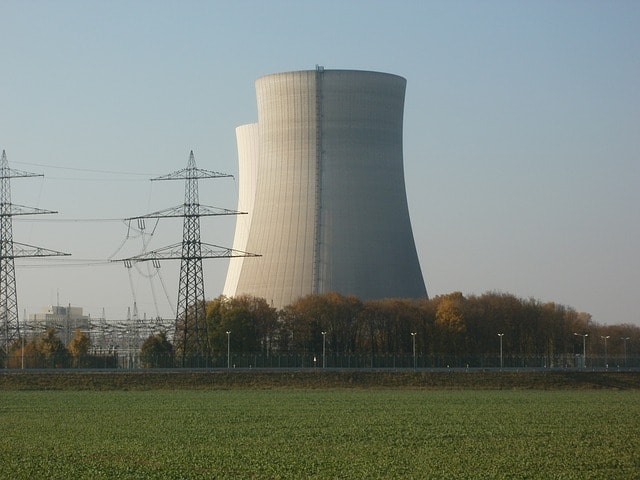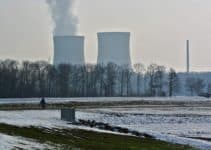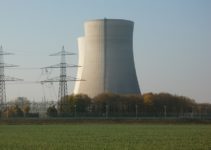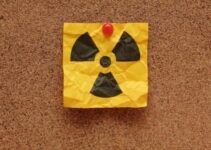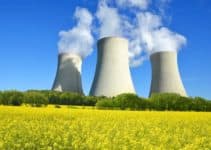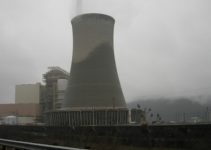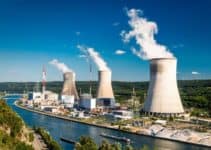Energy cannot be created nor be destroyed but it can be converted from one form to another. Nearly all the mass of the atom is concentrated in a tiny nucleus in the center. The nucleus is composed principally of two sorts of particles: the proton which carries the positive charge and the neutron which is electrically neutral and has a mass slightly bigger than that of proton. Nuclear energy is the energy released from the nucleus of an atom. When nuclear reaction occurs weather fission or fusion, it produces large amount of energy.
Lately, debates have raged over nuclear energy, which begs the question: Is nuclear energy the perfect formula that will finally satisfy the needs of the world’s electricity or will it end up to be the evil power that devastates the world? Read on to find the answers to this question.
Although the subject of nuclear power has evoked bitter memories such as the destruction of Hiroshima and Nagasaki, the Three Mile Island disaster, the Chernobyl accident and the nuclear catastrophe in Japan, it has one very attractive feature; it’s not fossil fuel. This means it does not need pumping out of the ground and does not contribute to dangerous emissions.
Nuclear energy is produced using two main processes; fission and fusion. Nuclear fission is able to generate well over 10 million times the energy which is produced by the combustion of fossil fuels. That’s the good part. On the flip side, nuclear fusion (which involves joining nuclei) is able to produce vast amounts of nuclear energy, but safe control mechanisms have not been developed yet. Fusion occurs naturally up in the sun and the stars as well as in nuclear reactors built by humans.
Various Advantages of Nuclear Energy
While using fossil fuels to generate electricity may carry no threat of a large disaster, they are not good for the environment since they emit unlimited amounts of greenhouse gasses. Nuclear energy is completely safe for the environment if managed properly. Here is a rundown on the main advantages of nuclear energy:
- Reliable
Nuclear reactors offer impressive based-load electricity and operate and produce power over 90% of the time. The periods between refueling have been substantially extended, plus downtime for refueling has been significantly minimized. In the United States, for example, these enhancements through the years have been equated to building one reactor each year to the existing ones. Most nuclear reactors are designed to operate for more than 40 years. Most of the reactors are nearing that age in perfect condition and projections are that they could still operate for another 20 years.
- No greenhouse gas emissions
Nuclear reactor operations emit zero greenhouse gasses. Although the process of mining, enrichment, construction and waste management of uranium involves emission of greenhouse gasses, the total emissions are way lower compared to emissions from fossil fuels.
- Competitive cost
The cost of nuclear power is very much stable and competitive. On the other hand, the cost of power derived from fossil fuels pretty much depends on the market. When the market is good, oil prices become stable. When the market is volatile, oil prices may shoot up or plummet.
- Nuclear energy is compact
A nuclear power station is compact, which means it quintessentially covers an area the size of a football stadium and the surroundings. Wind turbines, solar cells, and growing biomass all need huge area of land.
- The modern day nuclear power plants are safe
Developers of the current nuclear power plants have drawn from the weaknesses of the past disasters like the Three Mile Island, Chernobyl, and Japan. The current nuclear power plants do not depend on external electricity supplies or external water supplies for purposes of cooling. Instead, they utilize water fed by gravity, gas pressurized water tanks, and natural convection heat exchangers. These systems are referred to as ‘’passive safety systems.” Another advantage is the reactors can be installed underground offering added insulation against unauthorized access and external hazards
- Costs of operation are substantially low
Although the costs of setting up a nuclear power plant are extremely high, the electricity produced afterward is very cheap. To start with, the cost of uranium, the raw material for the production of nuclear energy, is not expensive. When the plant is up and running, the maintenance cost will hardly be felt. Even if market shifts occur and the cost of uranium shoots up, the effect on the cost of power will hardly be felt.
- Powerful and Efficient
The other main advantage of using nuclear energy is that it is very powerful and efficient than other alternative energy sources. Advancement in technologies has made it more viable option than others. This is one the reason that many countries are putting huge investments in nuclear power. At present, a small portion of world’s electricity comes through it.
Is Nuclear Energy Renewable?
The definition of renewable energy involves unlimited availability of the resource, the capability to replenish itself and the characteristic to cause minimum impact on the environment. The question of whether nuclear energy is renewable still elicits debates to this day despite the fact that it is a low-carbon power generation source. The 5 substantiated renewable sources of energy used on a daily basis include solar, wind, hydro, geothermal and biomass.
However, the largest point of view stipulates that nuclear energy is not really renewable. This hinges on a wide range of facts such as:
The chief raw material for the production of nuclear energy (uranium) is not a renewable resource. Uranium resources are quite limited, and the mining and refining process mightily impacts the environment. Also, transportation of uranium is risky. Safe transportation involves significant capital outlay and a lot of energy consumption.
After processing uranium, significant amounts of radioactive waste are generated. The resultant elements have extensive storage requirements and are known to stay radioactive and hazardous for thousands of years. Most countries have tried to recycle it, but the whole process is ineffective and relatively expensive, not to mention it’s a daunting task to store it safely. To add insults to the injury, nuclear storage sites can become prime targets for terrorists who are hellbent on killing more people simultaneously.
Some facts show that nuclear energy could become renewable
It’s a well-known fact that uranium resources are limited. However, their conversion to plutonium can relatively elongate their availability. Light water reactors make use of use uranium-235, which attributes to 0.7% of all natural uranium. On the other hand, IFRs or fast breeder reactors utilize uranium-238, which attributes to 99.3% of all natural uranium. Fast-breeder kinds of nuclear reactors are able to generate huge quantities of fissionable plutonium capable of sustaining nuclear reactions way longer than traditional fuels. This process of plutonium production could give nuclear energy the renewable status. Another advantage to plutonium production is that the waste left behind is a lot less hazardous. The waste will stop being radioactive after a few hundred years.
The good thing about nuclear waste from nuclear power plants is that it can be transferred into reprocessing units such that 95% of the spent fuel is able to be recycled and transported back for use in the nuclear plant. This process enormously minimizes the amount and toxicity of radioactive waste, making room for separate handling (storage or destruction) of the waste. Reprocessing of radioactive waste has since turned political with anti-technology lobby groups striving to end the proliferation of anything related to nuclear by dwelling on the extraordinary costs of reprocessing and the threat of terrorism.
Verdict
Despite the raging debates and contradictions, nuclear energy doesn’t qualify yet as a renewable energy considering the present state of production and waste disposal. Uranium, the chief raw material for nuclear energy production, is still a limited fuel resource (in fact, it occurs only in specific countries) and the reactors have the possibility of one day becoming unstable and dangerous. Also, reprocessing of nuclear waste is not happening as it should.
Nevertheless, if adjustments to the reactors under development and safe processing of radioactive waste would happen, nuclear energy could well be on its way to becoming a renewable energy.
